

JENA R. EGGERT
CEO & Founder RCR|HUB and JER Marketing
EDITORIAL: CELEBRATING
Hello RCM CommUnity,
Welcome to the April edition of RCM Connections! As always, we’re thrilled to have you here to share the stories and journeys of our RCM leaders. This month’s edition is all about tradition - the shared experiences that bind our CommUnity together.
Tradition weaves through the very fabric of life experiences. We see it in the dedication of athletes like Caitlin Clark, who stayed true to her alma mater and achieved greatness. It’s also evident in the annual pilgrimage to Augusta for the Masters Tournament, a tradition that brings together fans from all over the world.
CELEBRATING TRADITION
Here at RCR|HUB, we’re proud to carry on our own tradition of excellence. In the past year, we’ve been connecting providers with top-notch RCM Business Partners. This month, we’re especially grateful to Anthony Escobio, a 4th generation Tampan dedicated to his family and CommUnity, for sharing his exclusive story.
We hope you enjoy this month’s edition of RCM Connections! As always, we’re here to provide you with the resources and connections you need to succeed in the RCM CommUnity.
Wishing you all a happy and healthy April!
Cheering for you!
Jena Eggert Editor-in-Chief RCM Connections

TABLE OF CONTENTS
01. 08. 09. 15. 18. SPOTLIGHT ANTHONY ESCOBIO TGH SPOTLIGHT WHO IS TGH? SPONSORSHIPS BIG THANKS DERBY EDITION KY PROVIDERS WE NEED YOU RCR|HUB SPONSORSHIP OPPORTUNITIES

From New Hire to Transformational Leader: Anthony Escobio’s 25-Year Journey
at TGH

JENA EGGERT: Tell us about your journey to your current role. Where did you start? Did you major or minor in healthcare services?
ANTHONY ESCOBIO: Initially, Revenue Cycle was not on the radar. I was going to become a physician. However, I struggled with biology; Cs wouldn’t get me into medical school! A guidance counselor quickly pointed out that I needed to find a new career path and that medical school was not going to be an option. I was devastated! She noticed my strengths in communication and math, and with my experience as a part-time scheduler at University Community Hospital, she recommended I consider a career in healthcare administration. Once the rejection hurdle subsided, I pursued a general social science
degree and focused on revenue cycle opportunities. After graduation, I was going to begin my full-time career on the payer side. One day our revenue cycle leader came to my little cubicle behind registration, and said, hey, I heard you’re leaving. Have you ever thought about staying and getting into management? And I was like, yeah, that’s what I want to do, but it won’t be here. And he said, well, somebody just left the organization. It was a government programs billing manager. He said I think you could do that job. You’ll have to learn billing, Medicare regulations, and Medicaid. You know, at 23 years old, you don’t have a lot of fear at that point in your life. I said, sure, I can be the Medicare Medicaid billing manager. So that was it. I got a great opportunity when I was 23 years old to be the billing manager for essentially a 500+ bed two-hospital system with no experience, I mean zero experience. That director who took a chance on me is Frank Steiner, who went on to be the AVP of Revenue Cycle at Erlanger, and that’s how I started my leadership career. Frank and I were reunited when he came to work at TGH in 2018, where he now leads our Revenue Integrity division.
JENA: Mentors, as you alluded to Frank earlier. Are there others, and how have they shaped your career?
ANTHONY: There have been numerous individuals. One person who tops my list is Anthony. Let me explain at the beginning of my career. Once I agreed to stay, they arranged for me to attend a makeshift boarding school. Frank sent me to a vendor, the CEO of a reputable Revenue company, who was
2
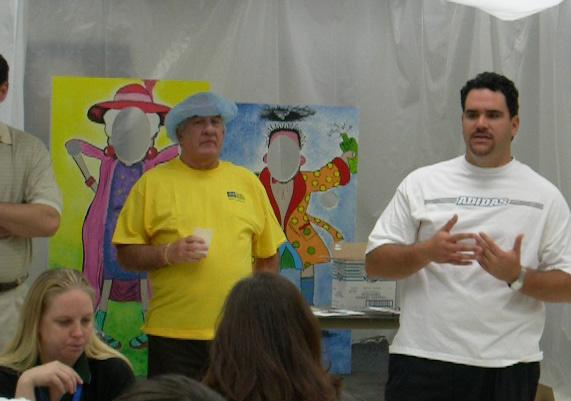
brilliant in the revenue cycle. He’d been doing it successfully at health systems and on the vendor side for many years. He knew everything about everything, whether it was Medicare or commercial; my director parked me with this guy I had just met for a month. I didn’t even report to my first day of work for a month because I had to learn the basics of back office, patient accounting, billing, Medicare-everything. And this guy did that for me. He taught me a ton and is still around and known in the industry. It’s Anthony” Tony” de Benedictus, a name you may recognize.
JENA: Investing in future generations is a key component of every industry. Is this also true for the Revenue Cycle?
ANTHONY: Yes. Investing in our future, I think, is a real problem we are having in our industry. We don’t have an engine that’s producing folks that are ready to go. Like other sectors have, folks find revenue cycle by accident like I did. And so, revenue cycle leaders like me need
to spend time trying to get that word out there. And so, I’ve worked with USF to do that periodically. I have an informal fellowship program that I’m very proud of. I’ve talked to you about it, or you’ve heard me talk about it in other forums, and instead of having a classic executive assistant, I hire a different role. A “Business Operations Manager” typically I look for someone finishing their master’s degree. The intent out of the gate is that they will only be with me for two to three years. They run projects, do executive reports, and help with contracts and vendor relations. They do everything I do and are ready to go after two to three years. I’m proud to say that the past cohorts are now filling leadership and analyst roles throughout the organization.
Thinking about the future of revenue cycle, it needs to be a priority for all of us. We need to think more strategically about creating positions (like the business operations manager) that will attract early careerists into the revenue cycle.
JENA: What do you look for in a leader?
ANTHONY: I look for people with competitive traits. I played a lot of sports in my younger days, and I have always been very competitive myself. I coach my son’s little league team; as you can imagine, it is extremely competitive in Florida. It’s comical at times, too- if anyone ever heard the things I shout from the dugout. Real competitors are never satisfied and are always trying to achieve better results. I do not even remember considering this when I made these choices, but now, when I look at
3
Anthony Escobio and Patient Accounts Director Marty Burgess in his early days at TGH talking to the team before a “pie your manager” event
my current team, that competitive trait is an obvious pattern of mine.
What is great about this is that competitors like to recruit other competitors, so I believe we have assembled a mighty “team” of very knowledgeable and highly competitive revenue cycle team members. As the “head coach,” if you will, I truly believe this gives us the best chance to “win.”
JENA: Did you see your career path and the potential for growth at Tampa General Hospital (TGH)?
ANTHONY: In 1999, TGH faced financial turmoil and rumors of a potential distressed sale. Despite skepticism from mentors like Frank, I took a leap, joining amidst high turnover and leadership issues. My role initially focused on billing accuracy and compliance. Just as I was starting to become more comfortable with my new role, there were some drastic leadership changes. Leveraging my background in patient access, I stepped into an interim director role, marking the start of TGH’s revenue cycle transformation.
Collaborating with consultants, we modernized systems over the next few years. The late John Frierson, a key mentor, played a pivotal role in this revitalization. Reflecting on their contributions, we still follow many of their frameworks and high-level strategies. When he handed me the keys in 2003, I worked closely with IT and other leaders at TGH to finish out the revenue cycle redesign. Soon after, we became nationally recognized for our robust adoption of the still-evolving
HIPAA Transaction code set. The strong technical revenue cycle foundation set us up to be one of the earliest adopters of EPIC Resolute in 2011. The transition to EPIC marked the start of the modern revenue cycle that we manage today. I guess you could say, “Like most that end up here,” I was thrown into a situation where career growth opportunities kept finding me. It is usually time and place… and then having the courage to take on the challenge and nailing the execution when you finally have the opportunity.
JENA: Let’s shift focus to numbers and the future. How many direct reports do you have, and how many are part of your broader Revenue Cycle team?
ANTHONY: I have five directors, and we have over 375 team members within Revenue Cycle just on the hospital team. TGH is a special place. So many great people come here to work and enjoy extended revenue cycle careers. I once managed a few team members who
FRIENDS OF TGH NIGHT AT LIGHTNING GAME
*Business Partners that Support TGH

4
TAMPA GENERAL HOSPITAL

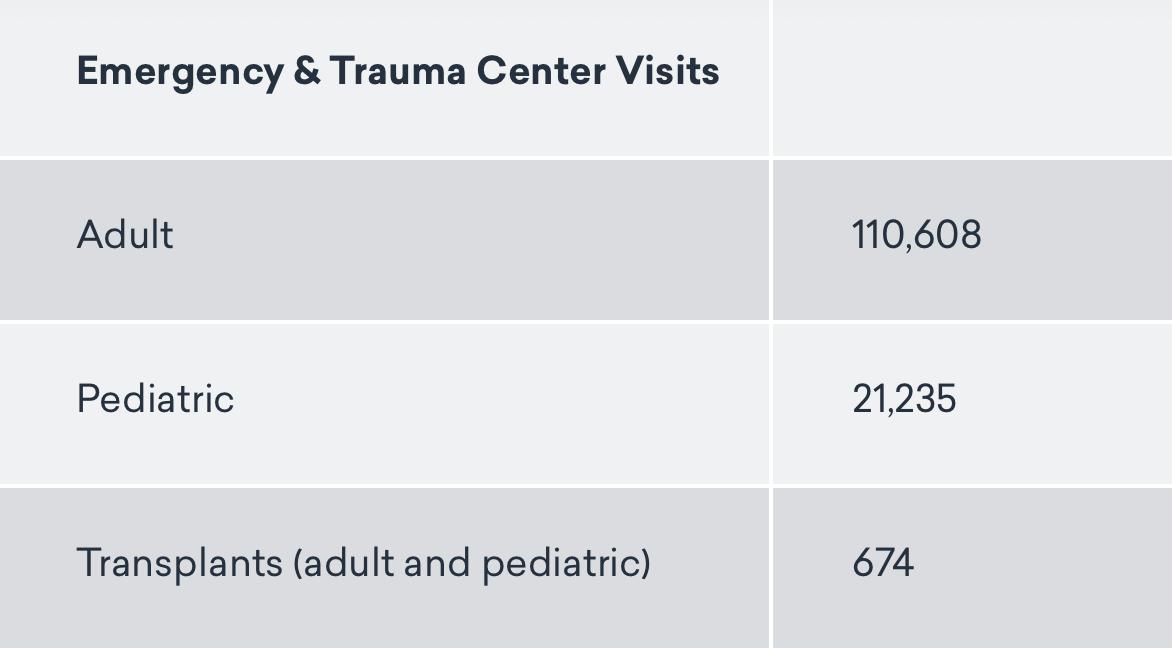

worked at TGH when I was born there.
JENA: Do you think the future of Revenue Cycle is changing? If so, how?
ANTHONY: Yes, I believe technology is going to reshape revenue cycle. We are in the middle of a significant transition in managing revenue cycle functions. Our specialties are shifting towards greater technological skills, moving away from the traditional experiential approach.
Healthcare revenue cycle ten years from now is going to be different. Daily, we can see how the work is evolving. It’s becoming a lot more technical and technically supported.
The evolution of the Revenue Cycle demands a different skill set than what we sought five, ten, or twenty years ago. These specialized skills may come at a higher cost, but I firmly believe that organizations will experience long-term cost savings, improved accuracy and reduced administrative overhead through increased reliance on technology. We’re already witnessing this transformation on the front end with self-service registration, kiosks, and text delivery of payment reminders, all of which streamline the processes and empower patients. Back-office automations are accelerating at a pace that has been difficult to keep up with, and now AI and other technology applications have become prevalent in mid-cycle work areas like coding and level of care decision-making. As we continue to leverage technology, we’ll see a shift towards more technical revenue cycle roles.
The puzzling twist to all of this is that we have invested so heavily in tools that have
5
I DON’T THINK IT IS AN ACCIDENT THAT I’M AT TAMPA GENERAL HOSPITAL “ “
led to incredibly accurate claims, and yet the data suggests we are getting worse at producing clean claims. When I began my career at TGH 25 years ago, and we received a claim denial, most of the time, we could find the problem that led to the denial and agreed we made a mistake. Now, in 2024, I feel like we are chasing ghosts. In most cases, we completely disagree that there was anything that should have prevented the full payment of the claim as agreed!! As you can imagine, this has all of us extremely frustrated. Something has to be done to mandate accountability to pay for services when everything is approved, and the claim is clean. As hospitals, we have “mandated accountability” to have highly accurate systems and audit and compliance practices to document all facets of the claim creation. This is where we have made the largest investments. We should all be concerned that we are continuing to expend significant resources to mitigate inappropriate
claim denials. I think of it this way …for every additional appeals nurse we hire in revenue cycle that is one less clinical nurse that could be at the bedside improving patient care. Can you imagine what the industry could achieve in the way of healthcare advancements and improved quality if hospitals were paid everything that we are owed with far less administrative cost?
JENA: Last question: what do you want to ensure that gets printed and shared with readers?
ANTHONY: Two things: I’m the fourth generation in Tampa. I love Tampa. My entire extended family is here. I was born at Tampa General Hospital, and my wife and I are raising our children here! I love the Rays, Buccaneers, Bulls, and Bolts!
JENA: I did not know that you were a fourth-generation Tampeño! You’re always enthusiastic and happy whenever you talk about your family and sports!
6
ANTHONY: I don’t think it is an accident that I’m at TGH. I have deep family roots, having been born at Tampa General Hospital. The Tampa connections make me particularly proud of my career in the revenue cycle. I may not have been able to help people through “medical practice,” but by helping support the growth and maturation of Tampa General, I was still able to make an impact. A strong academic medical center that acts as a safety net has a big impact on the health of the community. As TGH became more successful and transformed the entire Tampa community benefited. The financial stability we gained through years of thoughtful strategy and sound execution allowed us to expand access to high quality care for the underserved. I feel incredibly blessed to have been given an opportunity to be a part of this journey. These are the reasons why I don’t believe that it is an accident that this long career at TGH “found me.”
Lastly, through the years, I’ve seen that building strong relationships leads to success in our industry. I’m fortunate to have a network of colleagues across the country that I can call on for help or to chat. This network started as a necessity in my twenties when I was new to the field. I didn’t hesitate to contact people I met at HFMA events and develop friendships. Colleagues I barely knew would spend fifteen minutes or sometimes much longer helping me solve problems I had gotten stuck on.
Anthony and his family at their favorite summer spot Little Gasparilla Island, Florida
The tables have turned now. It feels great to be someone others call for guidance as they navigate their careers. Even as a seasoned veteran with almost 30 years in revenue cycle, I still need help sometimes, and I don’t hesitate to reach out to my network.
These are more than just professional contacts; they’re friends. These relationships are not bound by the confines of our careers; they will last beyond my professional journey. Even among colleagues whose health systems we compete with-I know I can pick up the phone and shoot the breeze about golf or fishing or ask for advice. They’re a true source of support and camaraderie, a constant in an ever-changing industry. We can’t forget that, as revenue cycle leaders, we are responsible for securing billions of dollars for our organizations in one of the world’s most highly regulated industries. Things can get hard, and having access to leaders with different perspectives is invaluable.

$240.3 7
TAMPA GENERAL HOSPITAL
SHARED PURPOSE
We Heal. We Teach. We Innovate. Care for everyone. Every day. VISION
TGH will be the safest and most innovative academic health system in America.
ABOUT:
Tampa General Hospital is a private, not-for-profit hospital and one of the most comprehensive medical facilities in Florida serving a dozen counties with a population in excess of six million.
The Wallace Trauma Center at TGH is the area’s only Level I Trauma Center and TGH is one of just two adult & pediatric ABA-verified burn centers in Florida. With five medical helicopters*, we are able to transport critically injured or ill patients from 23 surrounding counties to receive the advanced care they need. The hospital is home to one of the leading organ transplant centers in the country, having performed over 13,000 solid organ transplants. TGH is also a nationally certified comprehensive stroke center. Other outstanding centers include internal medicine, heart & vascular, orthopedics, oncology, high-risk and normal obstetrics, urology, ENT, endocrinology, neurosurgery, gastroenterology, parathyroid and thyroid, and the Muma Children’s Hospital at TGH including the Jennifer Leigh Muma Neonatal Intensive Care Unit. TGH is the primary teaching hospital for the USF Health Morsani College of Medicine.
COMMUNITY BENEFIT
$240.3 MILLION
5
benefit total includes charity care, subsidized health services, financial and in-kind contributions to local charities, health professions education, research and community health improvement.
Community
8
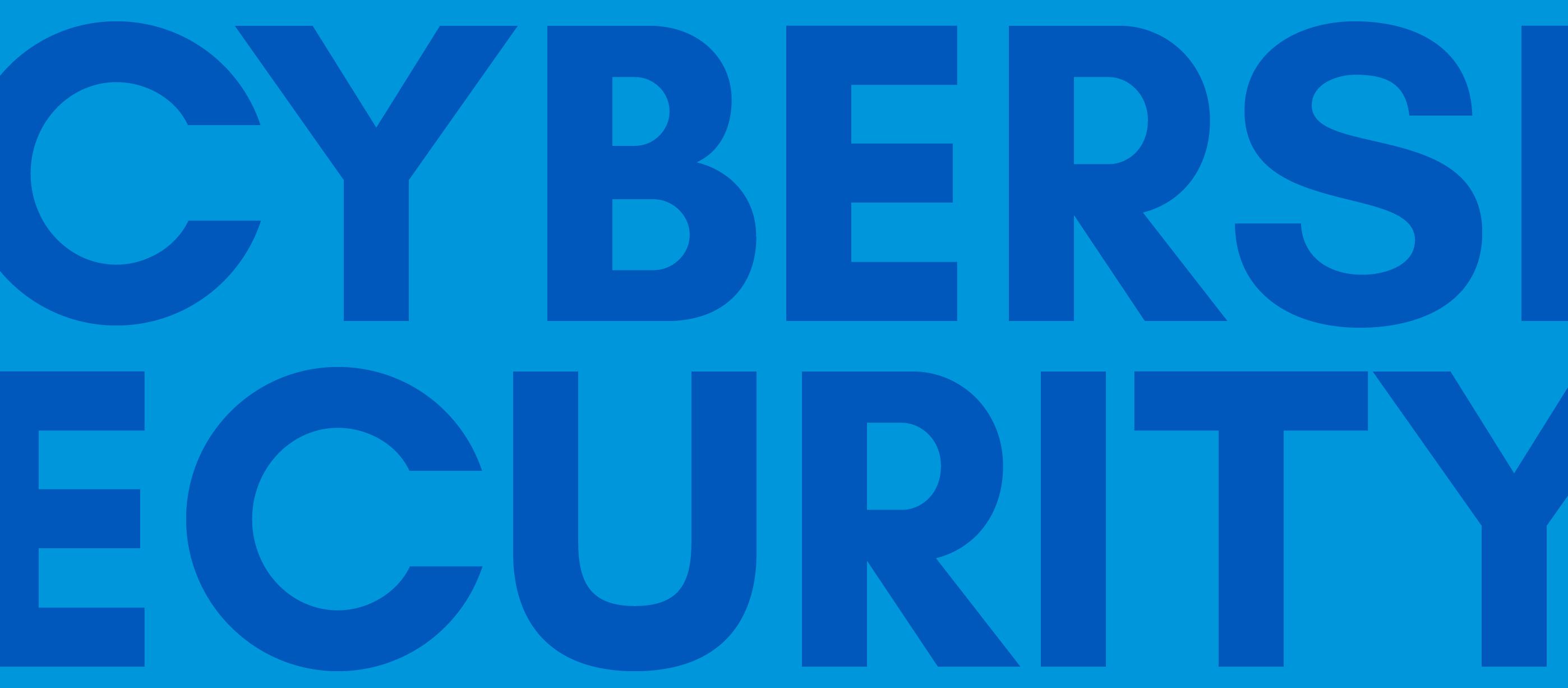
QUESTION:
What’s the one word you are seeing daily lately?
ANSWER:
CYBERSECURITY

OUR RESPONSE:
OUR RESPONSE:
We’re not here to offer another cybersecurity option. We’re here to help you think through what you’re not doing already. Check out our latest blog post by our Principal Software Architect and his advice on what options to consider.

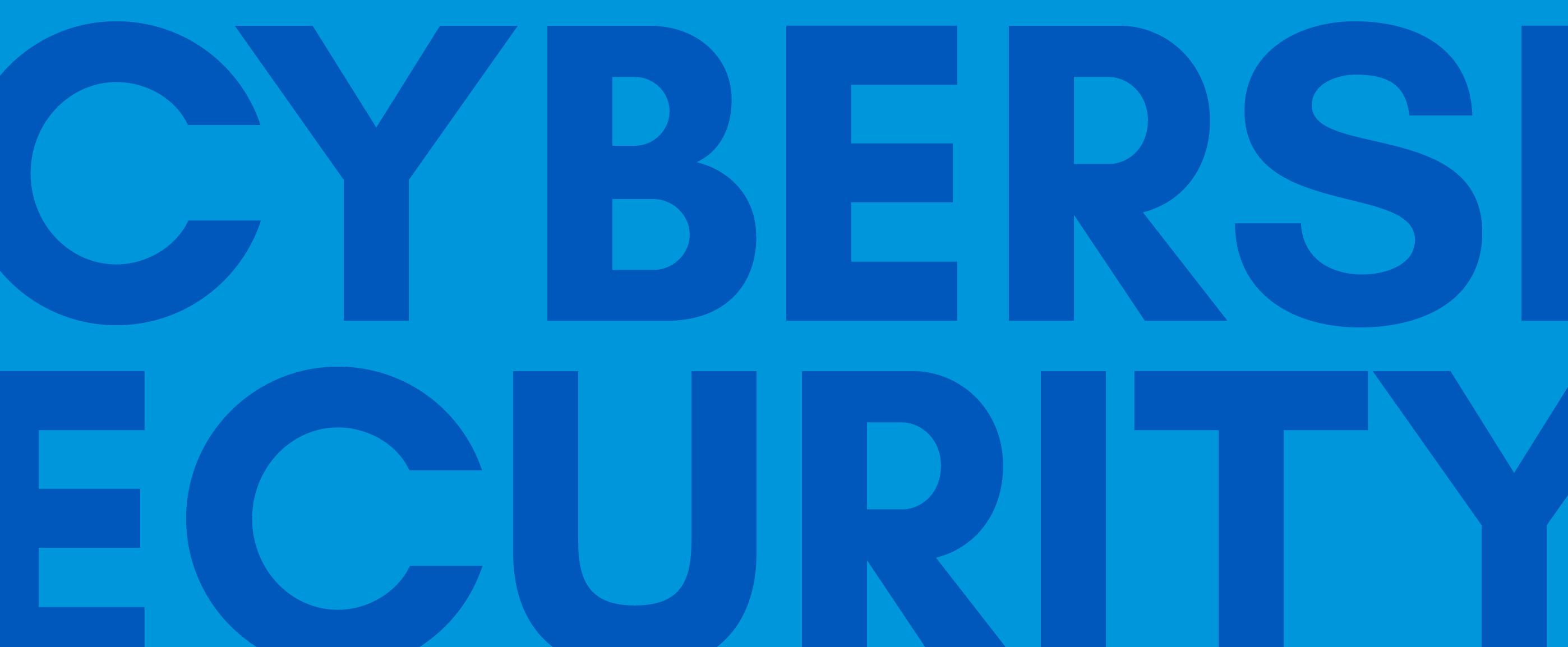
Reinventing Revenue Cycle. SparkChange is enhancing labor efficiency and revenue cycle effectiveness. We focus on accelerating your reimbursement process from presentation to payment with:
We’re not here to offer another cybersecurity option. We’re here to help you think through what you’re not doing already. Check out our latest blog post by our Principal Software Architect and his advice on what options to consider. Click

By leveraging connected technologies, we spark real change .
to Uncover
Learn more at sparkchange.health
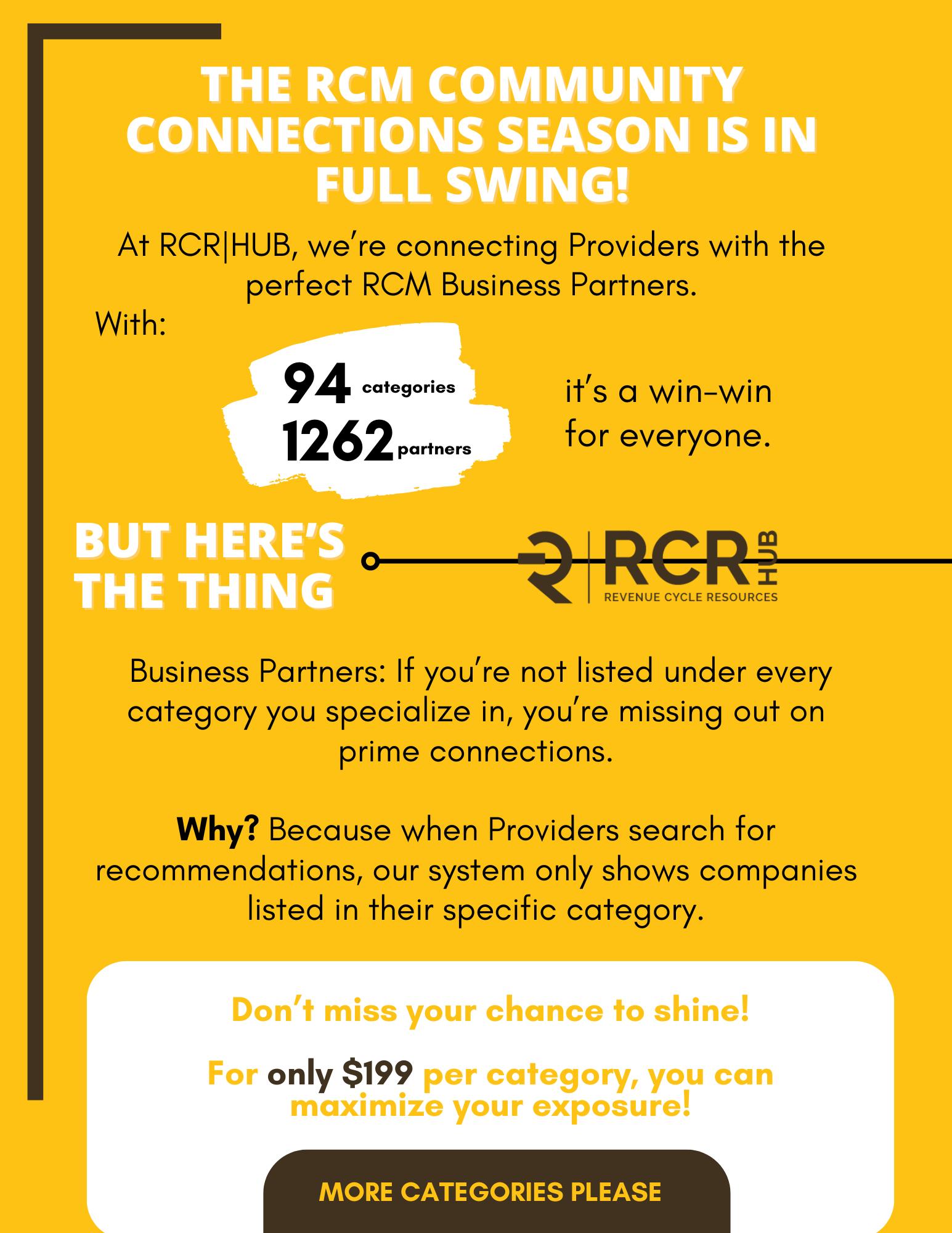


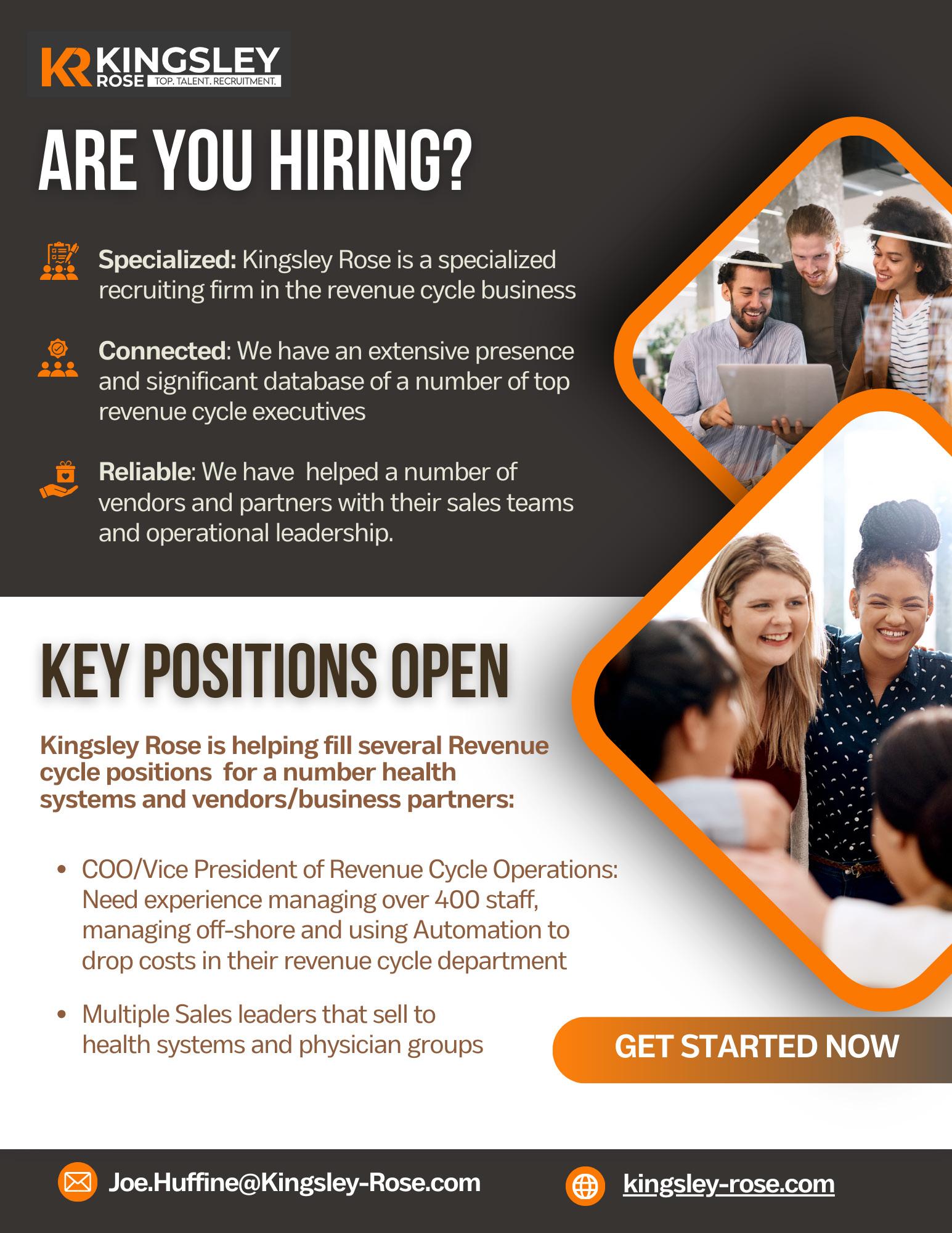




OPPORTUNITIES AT A GLANCE
OPPORTUNITIES FOR BUSINESS PARTNERS
Add Additional RCM Categories
Category Leaderboard Sponsorship
Hang Your Company Logo on a Billboard
Newsletter Ad Space
Innovation Hub Sponsor
Provider / Business Partner Editorial Sponsorship
OPPORTUNITIES FOR PROVIDERS
Comprehensive Resources
Streamlined Information
Networking Opportunities
Training and Education
Benchmarking Data
Technology Insights
.
Comprehensive Calendar of Events
18
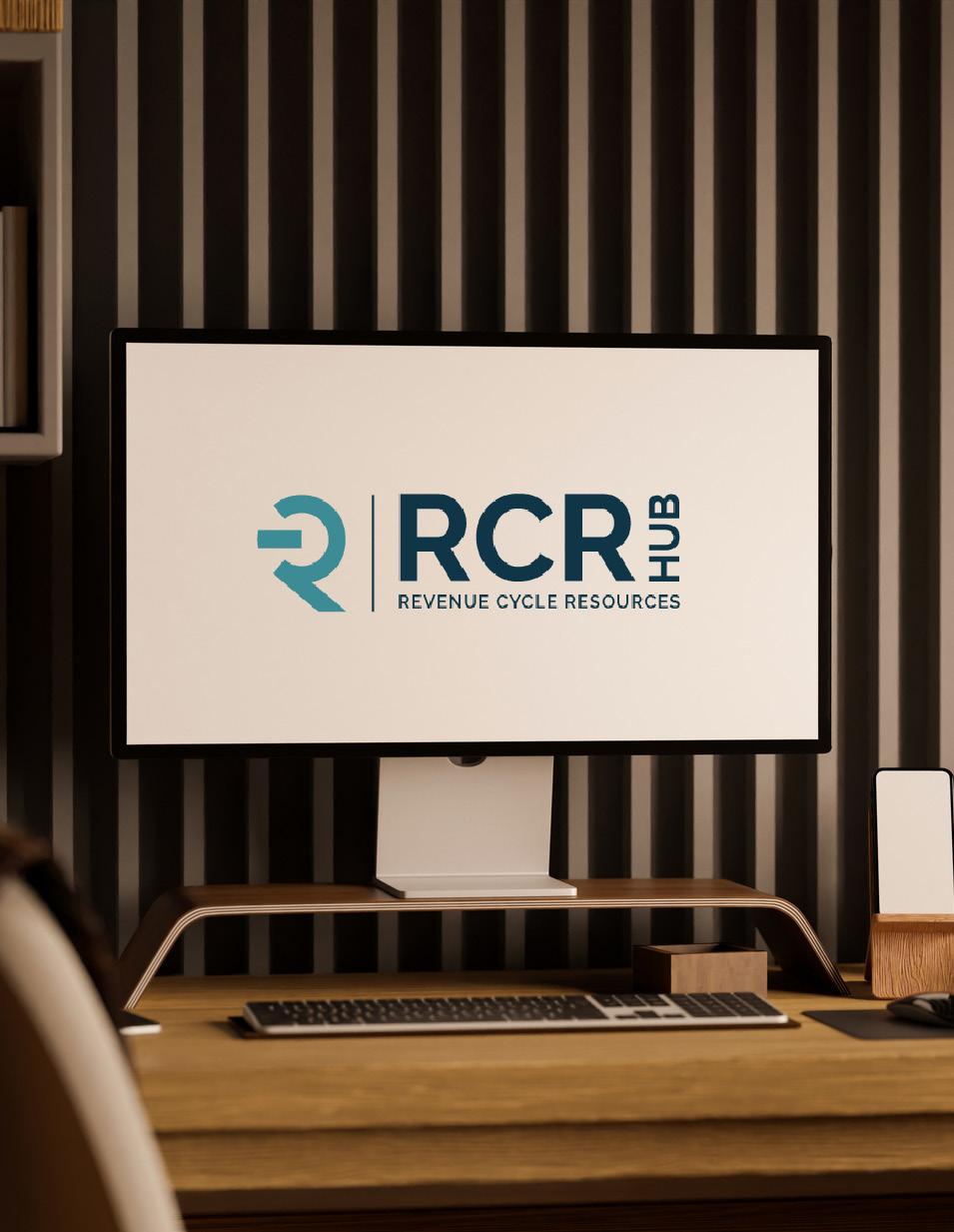
VISIT THE SITE Jena Eggert Paulina Molina CEO & Founder jena.eggert@rcrhub.com Marketing Manager marketing@rcrhub.com
























